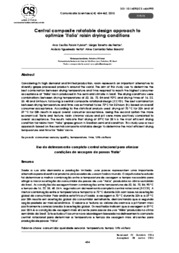Central composite rotatable design approach to optimize Italia raisin drying conditions.
Central composite rotatable design approach to optimize Italia raisin drying conditions.
Authorship: RYBKA, A. C. P.; FREITAS, S. T. de; FIGUEIRETO NETO, A.; BIASOTO, A. C. T.
Summary: Considering its high demand and limited production, raisin represents an important alternative to diversify grape processed products around the world. The aim of this study was to determine the best combination between drying temperature and time required to reach the highest consumer acceptance of ?Italia? raisin produced in the semi-arid climate in Brazil. The drying conditions were combinations between drying temperatures of 50, 56, 70, 84 and 90°C and drying times of 16, 22, 35, 48 and 54 hours, following a central composite rotational design (CCRD). The best combination between drying temperature and time was estimated to be 70°C for 35 hours (h), based on overall consumer acceptance. According to the statistical analysis used, drying at 70 °C for 35h and at 59 °C for 28h results in equal overall consumer acceptance, being the second option the more economical. Taste and texture, raisin chroma values and pH were more positively correlated to overall acceptance. The results indicate that drying at 59ºC for 28 h is the most efficient drying condition for raisins from ?Italia? grapes grown in Brazilian semi-arid condition. This study uses a new approach based on the central composite rotatable design to determine the most efficient drying temperature and time for Italia raisins.
Publication year: 2015
Types of publication: Journal article
Unit: Embrapa Semi-arid Region
Keywords: Análise sensorial, Grapes, Mercado, Secagem, Temperatura, Uva, Uva passa, Vitis Vinifera
Observation
Some of Embrapa's publications are published as ePub files. To read them, use or download one of the following free software options to your computer or mobile device. Android: Google Play Books; IOS: iBooks; Windows and Linux: Calibre.
Access other publications
Access the Agricultural Research Database (BDPA) to consult Embrapa's full library collection and records.
Visit Embrapa Bookstore to purchase books and other publications sold by Embrapa.

